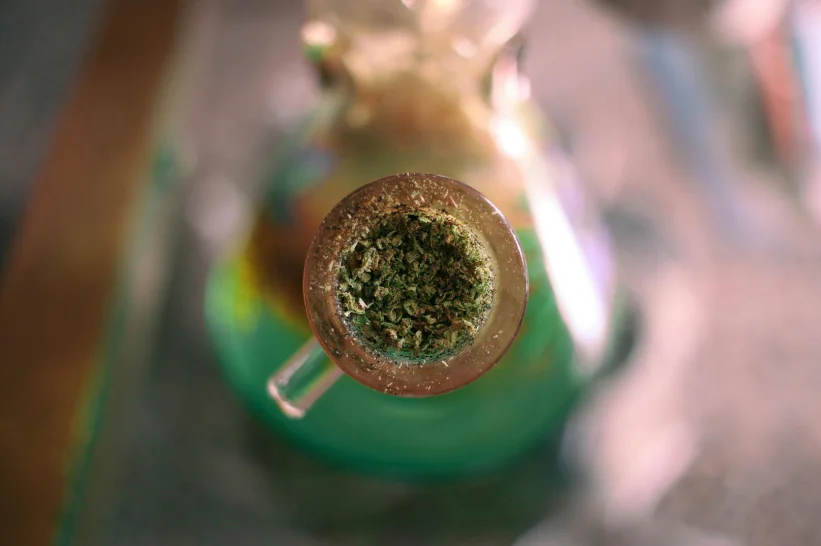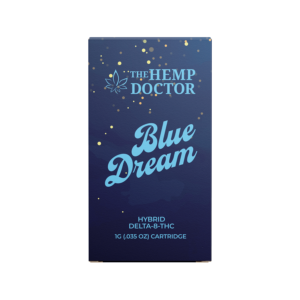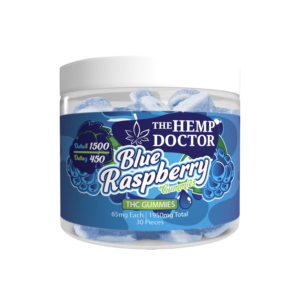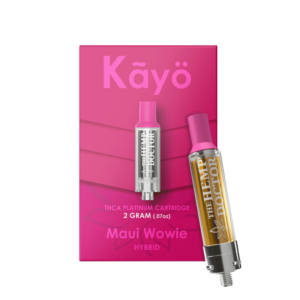
Many cannabis lovers enjoy smoking at nighttime as a way to wind down from a long, tiring day. For some, it’s a less detrimental substitute to alcohol as it provides the same inebriation without the bad decisions and head-splitting hangover the next day.
But that then begs a few questions: Is THCA safe to smoke at night? What are the upsides and downsides? Is it an advisable practice?
This article provides answers that should clarify any questions you may have. So, make sure you read until the end.
What Is THCA and How Does It Work?
THCA stands for tetrahydrocannabinolic acid. It is one of the many cannabinoids found in the plant, particularly in its raw, unheated state. But unlike the THC that we all know, THCA does not have the same mind-altering effects. This is why eating raw cannabis won’t get you high.
That’s because THCA is a precursor cannabinoid that requires “activation” through decarboxylation to take effect. Decarboxylation (also known as decarbing) is the process of heating the raw plant material to high temperatures, specifically between 200°F and 245°F (93°C to 118°C).
Due to its non-intoxicating properties, THCA is legal to consume. This cannabinoid is also found in hemp, which meets the standards of the 2018 Farm Bill that requires products not to exceed the 0.3% THC threshold.
Is It Safe to Smoke THCA in General?
Generally, yes, THCA flower is safe to smoke. However, a more in-depth answer to this question is more complex. Firstly, you must consider the psychotropic effects upon combustion. If you have an aversion to anything that alters the mental and physical state, this method may not be for you.
The consumption method itself is another thing to consider. Smoking will be harsh on the throat and lungs. Potential issues may arise if you have respiratory problems or if you’re simply not a fan of inhaling smoke.
Exploring the topic of THCA’s safety further involves discussing findings from early research. That said, research is still in its early stages, and much more is needed before any strong conclusions can be drawn.
For the curious mind, here is some research about THCA in its non-activated state.
- Recent research has shown that THCA may have some influence on glucose processing and body composition.
- A 2013 study examined the effects of THCA on nausea and vomiting.
- A 2020 study observed how THCA interacted with inflammation-related responses in joint tissue.
Nighttime Use: Does Smoking THCA Help or Hinder Sleep?
What will happen if you smoke THCA flower before sleep? Let’s break it down in plain terms.
By now, you know that THCA isn’t psychoactive in its raw form, but then becomes one the moment you light it up. When THCA is heated, it turns into Delta 9 THC. That means smoking THCA flower is essentially like smoking regular high-THC cannabis.
So right out of the gate, smoking THCA doesn’t keep it raw. You’re actually consuming activated THC.
So, is it sleep-friendly?
It depends. Some strains of THCA flower can promote a mellow, relaxed body high that many users associate with nighttime vibes. Others might deliver more heady, cerebral effects that aren’t ideal if you’re trying to wind down. Whatever strain that is, it’s a mixed bag. Your mileage may vary.
Factors that affect this boil down to three:
- Strain Type: Indica-dominant strains may be more calming, while sativa-dominant strains may be more stimulating.
- Dosage: A small puff might ease tension; too much might leave you overthinking bedtime.
- Tolerance & Body Chemistry: Everyone’s reaction to THC varies—some feel sleepy, others feel wired.
If you’re reaching for THCA flower to help you unwind at night, go slow and choose the right strain. Look for something known for relaxing effects (many Indica-dominant varieties fit the bill). And as always, test it out on a calm evening, not before a big Monday.
Potential Downsides to Smoking THCA During Nighttime
As we previously mentioned, smoking THCA would mean activating the THC and its mind-altering effects. For many people, numerous issues can arise from this, especially when they smoke at night.
Unhealthy Habit Formation
For some people, smoking cannabis can turn into an unpleasant habit. In worst cases, individuals become dependent and unable to function without a high. And these habits can easily form through frequent nighttime smoking.
Worsened Mental Health
THC misuse is known to have detrimental effects on a person’s mental health. Studies have revealed that schizophrenia spectrum disorders, including symptoms of delusions, hallucinations, disorganized motor behavior, and even speech disturbances, may arise from cannabis abuse. This may also begin with the prolonged habit of smoking at night.
Disruption of Sleep Quality
Especially when taken in higher doses, THC can disrupt a person’s sleep quality. A 2022 journal study revealed that overconsumption may lead to a reduction in total rapid-eye movement (REM) sleep and a decrease in the frequency of REM sleep.
Unpleasant Effects Upon Waking Up
Many people report feeling the extended effects of smoking cannabis upon waking up. Some refer to it as a “weed hangover,” where they experience headaches, fatigue, dry mouth, and even nausea when they wake up. And while remedies exist, weed hangovers are still a significant downside that people wouldn’t want to experience.
Best Practices for Smoking THCA at Night
While there may be downsides to smoking THCA at night, there are also ways to do it without compromising sleep quality.
1. Choose Strains With the Optimal Cannabinoid Ratio
THC and CBD are two of the most predominant cannabinoids found in the plant. And when they interact, they are known to elicit the plant’s known therapeutic benefits. This is known as the entourage effect.
However, ratios play a significant role in the possible outcome after smoking. Typically, there are four ways these are proportioned:
- Low THC: High CBD – In terms of enhancing sleep quality, experts recommend going for products that are low in THC and high in CBD to minimize the unwanted high. This is especially applicable for those who are new to smoking and have yet to get used to the effects.
- Equal Distribution – A balanced mix of THC and CBD can offer a middle ground. You’ll still feel some of THC’s calming effects, but the presence of CBD helps smooth out the edges. This ratio can work well if you’re not overly sensitive to THC and want a more well-rounded, manageable experience before bed.
- High THC: Low CBD – This combo delivers a stronger, more intense effect. Some people find this helpful when they want to knock out racing thoughts, but for others, it might be too much. If you’re newer to cannabis or sensitive to THC, it’s best to approach this ratio with caution, especially before sleep.
2. Choose Strains That Are Known to Promote Sleep
If there are “daytime” strains known to induce productivity and creativity, there are likewise “nighttime” strains that have the potential to promote restful sleep. It all depends on the terpene profile.
Certain terpenes have various effects that can help you wind down and prepare for bed. Here are some of them:
Myrcene: Known for having a slightly sweet and earthy aroma, this terpene is associated with the “couch-lock” effect that cannabis is known for.
| Strain: Grandaddy Purple is a notable example of an infamous strain packed with Myrcene. |
Terpinolene: This is one of the rarest terpenes and occurs in small quantities. Apart from repelling pests, this terpene is also known for its sedating effects.
| Strain: Super Lemon Haze is one of the popular Terpinolene-dominant strains. |
Caryophyllene: If you’re stressed from a long day at work, strains that are high in Caryophyllene could provide the soothing relief you’re looking for. The spicy and peppery aroma is the cherry on top.
| Strain: For strain examples, consider Bubba Kush. |
Linalool: For those who deal with an anxious mind at night, Linalool-dominant strains could help ease your worries. It comes with a sweet, lavender-like scent to help calm you down.
| Strain: Amnesia Haze is a strain rich in this terpene that is known to deliver results. |
Pinene: Pinene is another popular stress-relieving terpene that is also known to reduce sleep latency, or the time it takes for a person to fall asleep.
| Strains: Some strains high in pinene include Blue Dream Pie, Grape Ape, and the legendary OG Kush. |
3. Consume in moderation
Getting yourself too high or smoking extra potent strains may make you feel sleepy enough to doze off easily, but there’s a chance that you may still feel the effects the next day. For many people, stoneover isn’t a very pleasant experience.
If you’re new to smoking, start with low doses to avoid the extra grogginess. Timing is also a key factor, and the recommended window is at least half an hour before going to bed. This helps put your body in a relaxed-enough state to fall asleep eventually.
4. Be Mindful of Your Usage
In an earlier section, we mentioned how smoking every night may lead to unhealthy consumption habits. Using too much may lead to paranoia and a disrupted sleep pattern, while dependency may affect your overall quality of life.
The late great Oscar Wilde said it best: “Everything in moderation, including moderation.” This applies to everything, including cannabis for therapeutic use.
Alternatives to Smoking THCA Before Bed
If you’re not a fan of smoking before going to bed, there are other options to try that are not necessarily THCA. These are different forms of cannabis that can help you wind down and get ready for bed.
Delta 8 Tinctures
Unlike smoking, Delta 8 tinctures aren’t intrusive to the respiratory system. However, the slight downside is that its effects take some time to take effect. That said, experts advise taking tinctures an hour before bed. For dosage, start slowly before gradually increasing.
THCA Edibles
If you prefer edibles, take them approximately two hours before going to bed. That’s because it takes the body a while to process ingested THCA. More importantly, stick to the recommended dosage to avoid feeling the unpleasant effects associated with cannabis use.
Topicals
Topical cannabis is known to have calming effects for the mind and body, and the soothing sensation is perfect for sleep preparation. You can achieve these through massaging the topical cream or balm onto the skin. This can be a new nighttime ritual before bed.
Techniques such as regular meditation, minimizing screen time by reading a book, and sipping chamomile tea can help enhance your sleep. Other best practices include limiting caffeine intake and establishing a consistent sleep schedule.
Should You Smoke THCA at Night?
There’s nothing inherently wrong about smoking THCA at night. However, if you choose to do so, remember that it activates cannabis’s mind-altering effects, which may affect your sleep quality.
To avoid potential problems, make sure you’re not overconsuming. Similarly, select strains known to induce relaxation and promote sleep.
And since we’re on the topic of strains, here are some of The Hemp Doctor’s lab-tested THCA flowers. Explore our wide array of varieties, perfect for nighttime relaxation, including Forbidden Runtz, Jello Cake, Donnie Burger, and Slurty. Shop online with us today!
FAQs
As always, we conclude this article by addressing some frequently asked questions to provide further insight into what THCA is all about.







